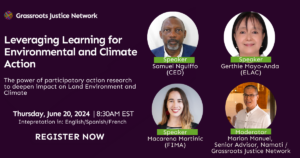Post
Leveraging learning for environmental and climate action
Our first movement call of the year brought together 86 members from all over the world!
 We learned how Participatory Action Research (PAR) is being applied in Chile, Cameroon, and The Philippines. Participatory Action Research is research with communities, and for communities: PAR is centered on impacted communities, who lead processes and decision-making. What distinguishes PAR from other forms of research is that affected communities are partners in the process, not just beneficiaries or subjects. PAR is directly in service of struggles for social justice. It is essentially using research to drive change.
We learned how Participatory Action Research (PAR) is being applied in Chile, Cameroon, and The Philippines. Participatory Action Research is research with communities, and for communities: PAR is centered on impacted communities, who lead processes and decision-making. What distinguishes PAR from other forms of research is that affected communities are partners in the process, not just beneficiaries or subjects. PAR is directly in service of struggles for social justice. It is essentially using research to drive change.
The Learning Agenda for Legal Empowerment aims to share learning about “what works” in different contexts. One of the ways in which we learn together is in the form of participatory action research projects led by Network members across Latin America, Africa, and Southeast Asia.
Here are top 3 takeaways from our rich discussion:
-
Participatory Action Research offers an approach to address specific justice issues.
In this movement call, we saw how Network members are using PAR to generate innovative solutions to real-life justice issues, and have deeper impact. While working with communities in Chile to protect their water from salmon fishing industries, Macarena Martinic observed that local knowledge is valuable as much as scientific expertise. In Cameroon, Samuel Nguiffo emphasized community dialogue is essential, especially over disputes about sacred land. Grizelda Mayo-Anda from The Philippines shared how sustainability in advocacy processes should be part of our discussions, especially in the mining sector, where a single court decision can take years.
-
Legal empowerment and PAR = winning combination for communities.
PAR can become a powerful tool of communication with communities, allowing legal empowerment organizations and paralegals to point out with clear information what challenges they are facing and why. As Network member Paolyel Onecan notes in the chat:
“Legal empowerment is important and makes communities stand for their rights. PAR makes the community understand what is happening and what they are responding to.”
Our speakers also emphasized the importance of communication. As PAR is a process, the action research projects allows them to have a look at how they are communicating, while at the same time, unlearning the complicated legal jargon.
-
It’s important to pause and reflect.
PAR allows space for reflection. This emphasis on reflection is fundamental to the Learning Agenda goals, where we endeavor to answer collective inquires to our most pressing challenges. Network member Tom Weerachat says in one of the breakout groups:
“My take-away is the importance of having the Learning Agenda as a space to pause and reflect; when shaping the law, you shape reality, and often we don’t pause to reflect on this.”
Our call featured an inspiring song from Moses Nkhana. Click here to listen to the song! You may also view the French, Spanish, and English recordings in the links provided.
Our next movement call will be on 12 September 2024. We will explore integrating gender transformative approaches in legal empowerment! Send an email to community@namati.org if you are interested in sharing your story!
In the meantime, here are ways to engage with the land, environment and climate work of GJN:
- Make sure you are getting the LEJ newsletter. Sign up here;
- Join a working group (interpretation in French and English);
- Follow us on X, Facebook, or Youtube;
- Share your experience! Use the community forum, share what you’d like to see in the newsletter, or in working groups!
SHARE THIS:
